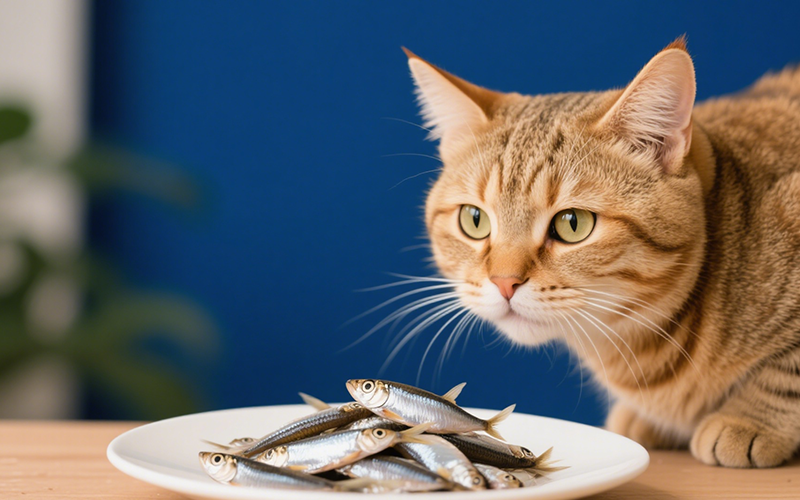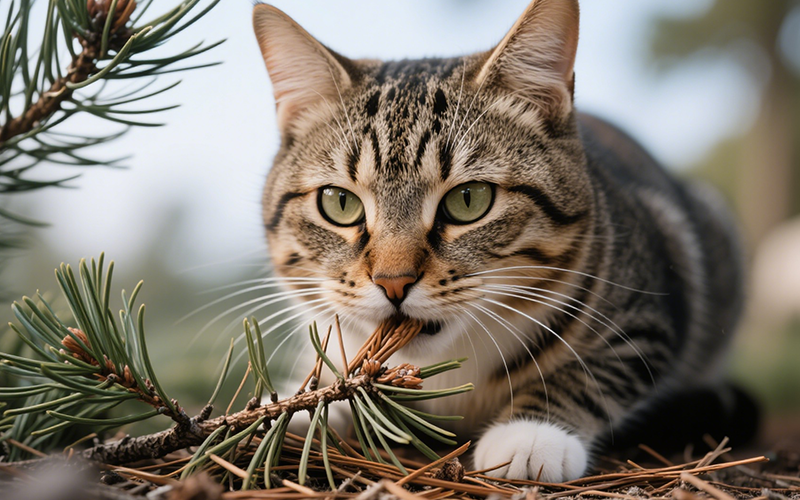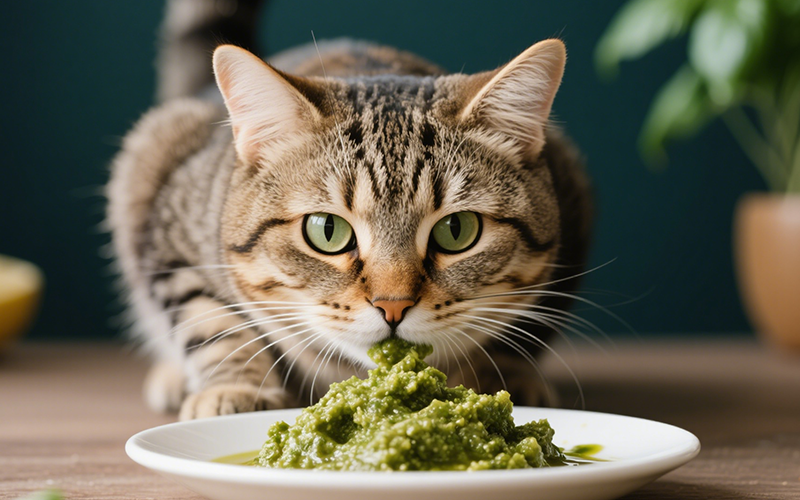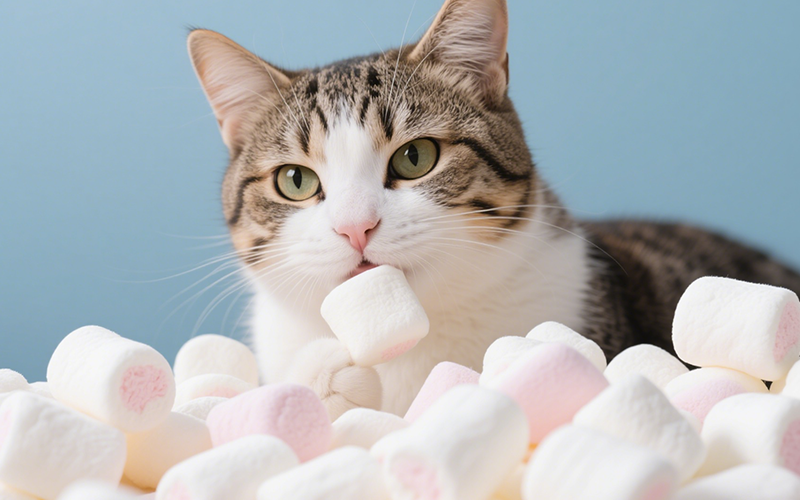Can Cats Eat Anchovies? A Fishy Treat or a No-Go?
- 10 Apr 2025 15:05
As a cat parent, you may wonder whether it's safe to treat your feline friend to the delicious taste of anchovies. After all, cats love fish, and anchovies are small, flavorful, and packed with protein. But before you share these tasty little fish with your cat, it’s important to know whether they’re a safe option. Let’s dive into the details! 🐾

Are Anchovies Safe for Cats?
The good news is that anchovies are generally safe for cats to eat in moderation! They offer a variety of nutritional benefits for your cat, but as with all treats, there are a few important things to keep in mind.
High Protein: Anchovies are rich in protein, which is great for your cat since they’re obligate carnivores and require animal-based proteins for energy and muscle growth. 🐱
Omega-3 Fatty Acids: These little fish are also packed with omega-3 fatty acids, which promote a healthy coat, reduce inflammation, and support overall heart health. 🐟
Low in Mercury: Unlike some larger fish species, anchovies are low in mercury, making them a safer choice for cats who enjoy fish as an occasional treat.
Potential Risks of Anchovies for Cats
While anchovies can be a healthy addition to your cat’s diet in moderation, there are some considerations to keep in mind:
Salt Content: The main concern with anchovies is their high salt content. Many anchovies are sold preserved in salt, which can be harmful to your cat if they consume too much. Too much salt can lead to dehydration, kidney problems, and other health issues. If you’re giving your cat anchovies, make sure to choose a variety that’s either unsalted or rinse off any excess salt before offering them to your cat.
Bones: Anchovies, like most fish, have bones. While these bones are generally small and soft, they can still pose a choking hazard or cause discomfort in your cat’s throat or digestive tract if not handled properly. Be sure to remove the bones carefully before serving them to your cat.
Portion Control: While anchovies are nutritious, they should only be given in small quantities. Too much fish, especially in a single serving, can upset your cat’s stomach or cause gastrointestinal issues, such as vomiting or diarrhea. 🙀
How to Safely Serve Anchovies to Your Cat
If you want to treat your cat to a tasty anchovy snack, here are a few tips to ensure it’s safe:
Choose Fresh or Canned Anchovies with No Added Salt: Always opt for fresh anchovies or those canned in water without added salt. If you have salted anchovies, rinse them thoroughly to remove excess salt before feeding them to your cat.
Remove the Bones: Carefully remove any bones to avoid choking hazards or digestive issues.
Serve in Moderation: Keep the portion size small. A few anchovies now and then can be a great treat, but don’t overdo it. Think of it as a special snack, not a regular part of their diet.
Can Anchovies Replace a Regular Cat Meal?
Anchovies are a delicious snack, but they should never replace a balanced, nutritionally complete meal designed for your cat. Cats need a specific balance of nutrients, vitamins, and minerals to thrive, and anchovies, though beneficial, are not a full replacement for a well-rounded cat food. 🍽️
Healthier Alternatives to Anchovies
If you’re looking for safe fish alternatives, consider offering your cat other fish-based treats, such as:
Cooked Salmon: Cats love salmon, and it’s an excellent source of protein and omega-3 fatty acids. Just be sure it’s cooked thoroughly and free of bones. 🍣
Canned Tuna (in water): Tuna is another fish that many cats adore. Again, choose tuna in water and avoid varieties packed in oil or brine. 🐟
Commercial Fish-Flavored Cat Treats: Many brands offer fish-flavored treats that are specially formulated for feline nutrition. These can be a safe and healthy alternative to human-grade fish.
What to Do If Your Cat Eats Too Many Anchovies
If your cat gets a little too excited and eats too many anchovies, monitor them closely for any signs of salt toxicity or gastrointestinal upset. Symptoms of too much salt can include excessive thirst, vomiting, or lethargy. If you notice any of these signs, it’s a good idea to contact a pet health professional for advice.
And if you're ever unsure about what your cat should or shouldn’t eat, PettureX is a fantastic tool to have on hand. PettureX is an AI-powered pet health assistant that offers 24/7 online consultations. You can quickly reach out for guidance if your cat ingests something they shouldn’t, or simply if you have questions about their diet and well-being. Plus, PettureX’s pet image recognition feature can help you track any health issues your cat might be experiencing. 🧑💻
Final Thoughts: Can Cats Eat Anchovies?
In moderation, anchovies can be a healthy and tasty treat for your cat. They offer protein and omega-3s, which are beneficial for your cat’s coat and overall health. However, because of their high salt content and small bones, it’s important to serve them carefully and avoid overfeeding. Always choose unsalted varieties and make sure to remove the bones before offering them to your cat.
Remember, treats like anchovies should never replace a balanced, complete diet for your cat, and if you ever have concerns about what your cat is eating, PettureX is there to help with expert advice and support. 🐾
Keep those little fishy treats safe and healthy for your feline friend! 😻
Related

The Prickly Truth: Can Cats Eat Pine Needles Safely? A Guide for Concerned Owners
- 24 Apr 2025
Pesto & Paws: A Dangerous Mix? Can Cats Eat Pesto Safely?
- 24 Apr 2025
Persimmons and Paws: Can Cats Safely Eat This Autumn Fruit? A Vet-Reviewed Guide
- 23 Apr 2025
Nutritional Yeast for Cats: Savory Sprinkle or Health Hazard? A Vet-Reviewed Guide
- 23 Apr 2025
Marshmallows and Cats: A Puffy Problem? Why Vets Say No to This Sugary Snack
- 22 Apr 2025
Kefir for Kitties? A Veterinarian-Reviewed Guide to Safety, Benefits & Risks
- 22 Apr 2025
The Burning Question: Can Cats Eat Jalapenos? A Comprehensive Safety Guide
- 21 Apr 2025
Cool Temptation: Can Cats Eat Ice Cream Safely? The Vet-Backed Truth
- 21 Apr 2025
Frankly Dangerous: Can Cats Eat Hot Dogs? Vet Explains the Serious Risks
- 16 Apr 2025
A Purrfect Protein? Can Cats Eat Ground Turkey Safely? (Vet-Reviewed Guide)
- 16 Apr 2025
